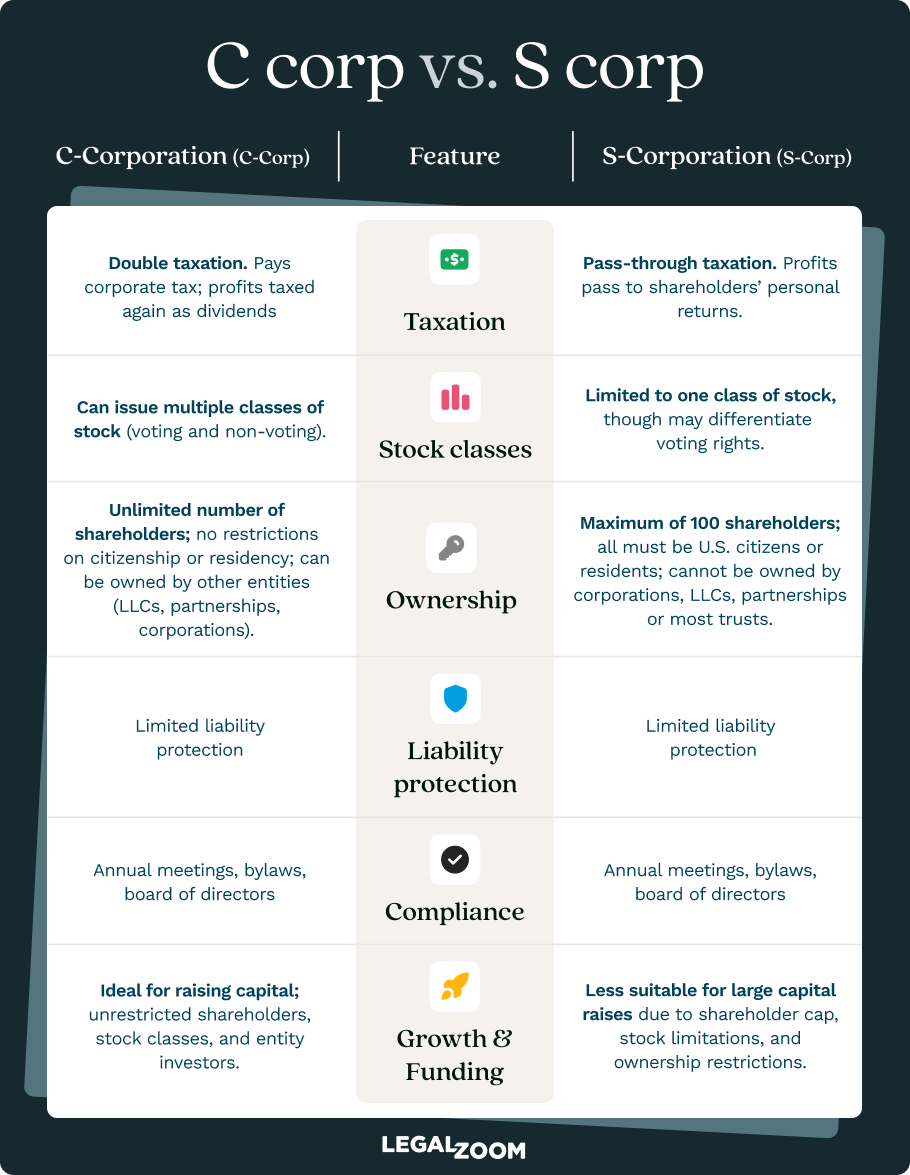Domestic corporations are one of the many structures under which your business can be organized. Put simply, a domestic corporation is a company that is incorporated in the same state in which they do business.

Domestic corporation: Definition and comparison
Corporations are a form of business entity that creates a separation between the business and its owners and shareholders. They are distinct from other types of companies like limited liability companies (LLCs), general partnerships, or sole proprietorships, although they are often similar.
There are two main types of corporations:
- C corporations, which are taxed separately from the owners and shareholders.
- S corporations, which file taxes by way of the owners of the company directly.
There are other, less common types of corporations as well, including B Corporations, which are identified as serving specific, public benefits rather than existing primarily to generate profits, and certain LLCs which choose to file taxes as official corporations rather than as partnerships.
A domestic corporation refers to a company that conducts business affairs under any particular state law. For example, if a corporation is formed in the state of Delaware, the business is a domestic corporation in that state. However, the Delaware-incorporated entity is a foreign business in any other state.
When discussing domestic and foreign corporations in this context, it's important to remember that we're talking about states, not countries. As previously noted, a business that is incorporated in and conducts business in Delaware is domestic to Delaware but foreign to every other state.
Forming a domestic corporation varies from state to state. Typical steps for formation include:
- Filing articles of incorporation and pay a filing fee
- Obtain an Employer Identification Number (EIN)
- Election of officers and directors
- Selecting a business purpose
- Draft bylaws and resolutions
- Select a tax classification
Creating a domestic corporation requires precise compliance with state law. Speak with a skilled and trusted business attorney to help you set up your corporation correctly.
Key characteristics
Domestic corporations have a number of identifying features that separate them from other types of business entities.
- Legal entity status. For legal purposes, a corporation is treated as a separate person distinct from any of its shareholders. This means that individuals associated with the business cannot be compelled to use their personal assets to settle business debts associated with the corporation, a safeguard known as limited liability protection.
- Taxation. Corporations are subject to a variety of taxes just like most other businesses, but the ways in which they are taxed can differ broadly depending on the corporation’s structure. Both C corporations and S corporations are typically required to pay income taxes, federal employment taxes like Social Security and Medicare, and excise taxes where applicable. Since C corporations are taxed as separate entities from the business’ shareholders, they can be subject to multiple stages of tax liability. First, the business’ profits are taxed, then that profit is taxed again when it is distributed to shareholders in the form of dividends. This process is often referred to as “double taxation.”
- Regulatory compliance. In order for a business to remain classified as a corporation, there are a large number of federal and state-specific regulations with which they must comply.
Some of these regulations are universal to all corporations, like wage guidelines and other labor protections related to workplace safety and anti-discrimination legislation. Other regulations can be industry-specific or related specifically to requirements of the state in which the corporation is formed. When establishing a domestic corporation, it’s important to ensure you have the required licenses and certifications for your local laws.

How do domestic corporations work?
A domestic corporation is established through a document known as its articles of incorporation, which outlines important information about the business’ purpose and organization. Articles of incorporation include things like the business’ structure and leadership, as well as the number of shares in the company and its purpose or goals in existing.
Corporations are one of many types of business structures, and knowing which structure is right for your business and your goals is the very first step in creating a successful business. By choosing the right structure for your new business, you can avoid financial and legal obstacles and set yourself up for success in your business’ early days.
If your business is best organized as a corporation, it’s important to determine what type of corporation will meet your needs. In addition to differences in tax obligations, S corporations and C corporations have a number of key differences.
S corporations are more restrictive in how they are owned, with a limit of 100 shareholders and the requirement that they all be U.S. citizens or lawful residents. C corporations are more flexible on ownership requirements, with no restrictions about residency or number of shareholders.
Different forms of corporations also follow different rules about how shares are distributed and what shareholders are entitled to from the company. In a C corporation, owners may choose preferred stock which affords them a higher priority when dividends are distributed at the cost of their voting rights within the company. S corporations do not offer these types of shares, instead offering only common stock and unrestricted voting rights to owners.
Should you form a domestic corporation?
Every business is different, and a structure that works for one might be detrimental to another. There are a host of advantages and disadvantages that come with establishing your business as a domestic corporation.
Advantages of forming a domestic corporation
- Limited liability protection. One of the biggest advantages of domestic corporations is the limited liability protection it confers, which prevents personal assets from being used to satisfy business debts.
- Perpetual existence. Unlike a sole proprietorship or general partnership, a corporation continues to exist even if its founding members are no longer involved with the company. This structure allows for greater longevity and accounts for unforeseen departures or conflicts between the organization’s founders.
- Ability to raise capital. A corporation is able to raise money more quickly than some other forms of businesses by selling shares of its stock, providing an easier way to produce capital than certain other businesses.
- Credibility. For many customers and potential investors, a corporation is a more appealing business to engage with than companies that do not have the limited liability protections and other safeguards afforded to a corporation. These protections often make outsiders more comfortable trusting the company to remain solvent and continue to do business in the long term.
Disadvantages of forming a domestic corporation
- Complexity and cost. While corporations afford a variety of protections to owners and shareholders, those protections do come at a cost. Generally, corporations are more expensive to establish and maintain than other business types, and often require assistance from an expert to properly form.
- Double taxation. Certain corporations established as C corporations will be subject to double taxation on profits as the business’ income flows from customers through the corporation and onto shareholders.
- Regulatory requirements. Corporations are heavily regulated compared to other business types, requiring owners to stay aware of existing and new regulations on how their company operates at all times to avoid fines or other punitive measures from state and federal regulatory bodies.
Operating a domestic corporation in another state
Now that you've determined which state to file your corporation in, you'll need to determine if you're going to conduct business in other states. If you are, you have another decision ahead of you.
When you decide to conduct business in other states, you have two options:
- Conduct business as a foreign corporation.
- Domesticate your foreign corporation in other states.
Conducting business as a foreign corporation is straightforward, though the process and requirements do vary from state to state. You must file certain forms with the state registering as a foreign corporation doing business in that state. Your other option is to domesticate your foreign corporation in the states where you want to do business. This option comes with a harsh legal ramification: You must dissolve your corporation from the state in which you originally filed. If, however, you're relocating your business, this would be a good alternative.
Special considerations
The needs of domestic corporations are often compared to states’ legal frameworks for businesses before choosing where to incorporate. Maybe you want to file in your home state for convenience. Or maybe you want to file in Delaware.
Many corporations choose Delaware because of the state's unique and business-friendly laws. For example, most states require business disputes to go through civil court, which can be rather time-consuming due to significant backlogs of other civil-related cases. Delaware, however, provides a Court of Chancery that solely handles business disputes. Therefore, while you may not reside in Delaware, it may be beneficial to file your corporation in Delaware for other reasons.
You may also choose to file in a state with business-friendly tax laws. But beware of doing this solely for tax reasons. Federal law says that states can tax all income from within its borders. While you may form your corporation in a state with pro-business tax laws, i.e., Delaware, you might still have to pay higher taxes if all of your business income derives from your home state.
When setting up a corporation, you have options, but you need to choose carefully. After you have formed your corporation, it can be both costly and time-consuming to relocate and make changes to your business structure. A trusted legal adviser can ensure you make the right decisions about domestic corporations vs. foreign corporations.
Domestic corporation FAQs
What are the tax obligations of a domestic corporation?
Every state’s tax requirements are different, but generally, a domestic corporation can expect to be liable for state income taxes where applicable, federal employment taxes like Social Security, and excise taxes on certain goods and services created or consumed by the corporation.
Can a domestic corporation do business in other states?
A domestic corporation, strictly speaking, can only do business in the state in which it is registered. Most domestic corporations can expand their reach, however, by filing in other states as foreign corporations. In most cases, a corporation’s business practices can remain largely unchanged in the new state, but they must be registered differently for tax and regulatory purposes.
Can I convert my corporation to an LLC?
Yes, it is possible to switch your business’ classification from a corporation to an LLC. After operating a business for some time as a corporation, many smaller business owners typically examine their needs and find the flexibility and favorable tax requirements of an LLC are more appropriate for their company.


